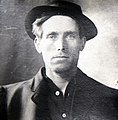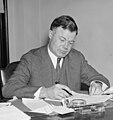Portal:Organized Labour

Introduction

- In trade unions, workers campaign for higher wages, better working conditions and fair treatment from their employers, and through the implementation of labour laws, from their governments. They do this through collective bargaining, sectoral bargaining, and when needed, strike action. In some countries, co-determination gives representatives of workers seats on the board of directors of their employers.
- Political parties representing the interests of workers campaign for labour rights, social security and the welfare state. They are usually called a labour party (in English-speaking countries), a social democratic party (in Germanic and Slavic countries), a socialist party (in Romance countries), or sometimes a workers' party.
- Though historically less prominent, the cooperative movement campaigns to replace capitalist ownership of the economy with worker cooperatives, consumer cooperatives, and other types of cooperative ownership. This is related to the concept of economic democracy.
The labour movement developed as a response to capitalism and the Industrial Revolution of the late 18th and early 19th centuries, at about the same time as socialism. The early goals of the movement were the right to unionise, the right to vote, democracy and the 40-hour week. As these were achieved in many of the advanced economies of western Europe and north America in the early decades of the 20th century, the labour movement expanded to issues of welfare and social insurance, wealth distribution and income distribution, public services like health care and education, social housing and common ownership. (Full article...)
Selected article
The International Labour Organization (ILO) is a United Nations agency whose mandate is to advance social and economic justice by setting international labour standards. Founded in October 1919 under the League of Nations, it is one of the first and oldest specialized agencies of the UN. The ILO has 187 member states: 186 out of 193 UN member states plus the Cook Islands. It is headquartered in Geneva, Switzerland, with around 40 field offices around the world, and employs some 3,381 staff across 107 nations, of whom 1,698 work in technical cooperation programmes and projects.
The ILO's standards are aimed at ensuring accessible, productive, and sustainable work worldwide in conditions of freedom, equity, security and dignity. They are set forth in 189 conventions and treaties, of which eight are classified as fundamental according to the 1998 Declaration on Fundamental Principles and Rights at Work; together they protect freedom of association and the effective recognition of the right to collective bargaining, the elimination of forced or compulsory labour, the abolition of child labour, and the elimination of discrimination in respect of employment and occupation. The ILO is a major contributor to international labour law.
Within the UN system the organization has a unique tripartite structure: all standards, policies, and programmes require discussion and approval from the representatives of governments, employers, and workers. This framework is maintained in the ILO's three main bodies: The International Labour Conference, which meets annually to formulate international labour standards; the Governing Body, which serves as the executive council and decides the agency's policy and budget; and the International Labour Office, the permanent secretariat that administers the organization and implements activities. The secretariat is led by the Director-General, Gilbert Houngbo of Togo, who was elected by the Governing Body in 2022. (Full article...)
November in Labor History
Significant dates in labour history.
- November 01 - Malbone Street Wreck occurs on the first day of the BLE strike in 1918 in the U.S.; the first congress of the International Trade Union Confederation is held; the International Harvester strike of 1979–80 began
- November 02 - Brian Behan died
- November 03 - Nathan Feinsinger died; the U.S. Supreme Court decided Marquez v. Screen Actors Guild Inc.; Dennis McDermott was born
- November 04 - Tomasz Arciszewski was born; James Green was born
- November 05 - Eugene V. Debs was born; Nimrod Workman was born; Agustín Tosco died; the 2007 Writers Guild of America strike began
- November 06 - Lloyd McBride died
- November 08 - Ed Boyce was born; the 1892 New Orleans general strike began
- November 09 - Congress of Industrial Organizations founded in the U.S.; Philip Murray died; Danny Greene was born; the Chicago Federation of Labor is founded
- November 11 - Centralia massacre occurs in the U.S.
- November 12 - Bituminous coal strike of 1974 begins in the U.S.; the Democratic Confederation of San Marino Workers is formed
- November 13 - The UK firefighter dispute 2002–03 begins; Karen Silkwood died; the International Typographical Union begins publishing the Green Bay News-Chronicle during a strike
- November 14 - The High Court of Australia issues its ruling in New South Wales v Commonwealth, upholding the validity of WorkChoices; Daniel J. Tobin died; the 2007 German national rail strike began
- November 15 - Federation of Organized Trades and Labor Unions founded in the U.S.; Raymond McKay was born
- November 16 - Jean Maitron died; the Jamaica Association of Local Government Officers is founded; Georges Marchais died
- November 17 - Harold J. Gibbons died
- November 18 - Chris Watson died
- November 19 - William J. McCarthy died; Joe Hill is executed; the National Writers Union is formed
- November 20 - Giles Hart was born; Richard Cordtz died
- November 21 - William Green died; the Columbine Mine massacre occurred in 1927 in the U.S.
- November 22 - David McDonald was born; Philip Murray is elected president of the CIO
- November 23 - Harry Van Arsdale, Jr. died
- November 24 - Charles Millard died
- November 25 - George Mock died; the 2006 Progressive Enterprises dispute begins in New Zealand; Ted Saskin becomes executive director of the NHLPA in 2005
- November 26 - The National Confederation of the Trade-Union Organizations of Ukraine is formed; Nimrod Workman died; Eliot V. Elliott died
- November 27 - Donald Richberg died
- November 28 - The U.S. Supreme Court decides Eastern Associated Coal Corp. v. United Mine Workers of America; André Morell died; William McFetridge was born
- November 29 - John P. Frey died
- November 30 - Mary Harris "Mother" Jones died; the General Federation of Trade Unions of Korea is formed
More Did you know (auto-generated)
- ... that labor lawyer Dick Moss argued the 1975 case which resulted in the establishment of free agency in Major League Baseball?
- ... that Sting wrote "We Work the Black Seam" because he felt that "the case for coal was never put to the nation" during the 1984–85 British miners' strike, which began 40 years ago today?
- ... that Ana Sigüenza was the first woman to be the general secretary of a national trade union center in Spain?
- ... that the 56-foot-tall (17 m) monument to the theologian Samuel Rutherford near his parish church in Anwoth was badly damaged by a lightning strike five years after its construction?
- ... that in the 1951 court case Kuzych v White, on appeal from the British Columbia Court of Appeal, five law lords of the British Judicial Committee ruled in favour of a Communist-led trade union?
- ... that the opening day of a California TV station was affected by a strike when workers refused to cross a two-man picket line?
Related Portals
Selected image
Selected Quote
Nothing moves in the city, without our say-so. Let the bosses curse, let the papers cry. This morning I saw it happen with these ancient eyes of mine. Without our say-so nothing moves but the tide!"
|
— Rob Rosenthal, written during the Seattle General Strike of 1919. |
Did you know
- ...that labor leader Victor Kamber created playing cards with public figures in 1968 and the "Rappin' Ronnie" music video depicting a rapping Ronald Reagan in 1984?
- ...that members of the Chinese Hand Laundry Alliance faced surveillance, interrogation, and harassment by the FBI?
- ... that one former Chair of the U.S. National Labor Relations Board described the position as "more like a bully pulpit than a position of authority"?
Topics
Get involved
Also see our sister WikiProject, Housing and Tenant Rights!
Associated Wikimedia
The following Wikimedia Foundation sister projects provide more on this subject:
-
Commons
Free media repository -
Wikibooks
Free textbooks and manuals -
Wikidata
Free knowledge base -
Wikinews
Free-content news -
Wikiquote
Collection of quotations -
Wikisource
Free-content library -
Wikiversity
Free learning tools -
Wiktionary
Dictionary and thesaurus
















































































